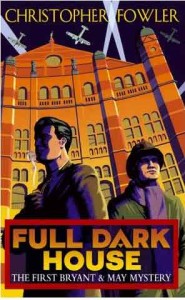 Christopher Fowler’s Full Dark House is the best mystery set during the London Blitz of the early 1940s that I’ve ever read, bar none. It is also the best mystery set within the very peculiar world of the theater that I’ve read. It is every bit as good as Foyle’s War, the BBC series I watched, where the Second World War has just begun and England’s fate looks bleak indeed in the face of an inevitable German invasion, bur someone still has to fight crime on the home front. Who better than Christopher Foyle in that series, and who better in this mystery series than Arthur Bryant and John May of the newly formed Peculiar Crimes Unit?
Christopher Fowler’s Full Dark House is the best mystery set during the London Blitz of the early 1940s that I’ve ever read, bar none. It is also the best mystery set within the very peculiar world of the theater that I’ve read. It is every bit as good as Foyle’s War, the BBC series I watched, where the Second World War has just begun and England’s fate looks bleak indeed in the face of an inevitable German invasion, bur someone still has to fight crime on the home front. Who better than Christopher Foyle in that series, and who better in this mystery series than Arthur Bryant and John May of the newly formed Peculiar Crimes Unit?
As I said in reviewing another novel in this series, Ten Second Staircase, these are two unique characters: ‘This Christopher Fowler novel is indeed called ‘A Bryant & May Mystery’ and it features quite probably the oldest and oddest set of detectives in any mystery series I know of — Arthur Bryant and John May, who first joined the Peculiar Crimes Unit during the London Blitz of the early 1940s! Bryant is, by my estimate, a bit north of eighty years and feeling every bit of his age, both mentally and physically, but May is maybe a half decade younger and in much better shape. Arthur Bryant seems to inherently believe in the supernatural as being at the root of their peculiar mysteries, but May is more of a rationalist. Full House Dark, the debut novel in this series, which I am reading next, won the Best Novel aka the August Derleth Fantasy Award in 2005 from the British Fantasy Society, which suggests that Arthur is sometimes right!’
Well, possibly. Or possibly not. Do not read this novel expecting it to have overt fantastical elements, as it doesn’t. Whatever reason the British Fantasy Society gave for the August Derleth Fantasy Award is completely lost on me. And yes, it annoyed the Hell out of me as I kept waiting for whatever was fantastic to show its face. It didn’t. %$#@! There is a very quirky minor fantastical element or two very near the end of this novel, but what you are reading a mystery novel grounded firmly in this reality.
What we do have here is a very good ‘haunted theatre’ mystery complete with a strange creature barely glimpsed by the actors and crew of the theatre. The theatre itself should mean something to you, as it is the Savoy Theatre, which Richard D’Oyly Carte opened during the run of Librettist W. S. Gilbert and composer Arthur Sullivan’s Patience, and which became the partnership’s permanent home. Like many of the theatres built in the late Victorian era, it had fallen on hard times, which is how this somewhat odd theatre company had come to be leasing it to stage a play both rich in mythological themes and more than a bit of nudity. Nudity which will no doubt pack the punters in! Well, it would if someone wasn’t killing off the cast in most horrific ways.
In Ten Second Staircase, I was left with the impression that Arthur Bryant and John May had grown more eccentric over the sixty years they had been in the PCU. Or at least I figured that Arthur had, but Full Dark House establishes that the personalities of both men are very much as they had been sixty years ago. Arthur firmly believed from the beginning that the Peculiar Crimes Unit was, errr, more of what we’d now call an X-Files unit than one dealing with more mundane crimes. So a series of murders in a theatre that have no apparent logical explanation has Arthur consulting with psychics who keep stuffed cats as mediums and constructing fiendishly complex theories of what happened here.
All of this is placed against the backdrop of the Blitz, in which the conventions of what was normal for London society have been ripped asunder, as both the City itself and the psychological well-being of Londoners have been literally been shattered by the German bombs. It is as horrifying a look at the Blitz as I’ve seen in any piece of fiction, either written or televised! Fowler has given us arguably the best mystery novel set in that period that has been written to date. And the various threads of the early days of the Peculiar Crimes Unit, the War itself, the murders, and the odd culture of a theatre company ensconced in the decaying Savoy Theatre are all interconnected in a most satisfactory manner.
The bottom line? If you’re looking for a police procedural with interesting characters and a well-crafted plot, this is well-worth your time to read. If you’re looking for a mystery with fantastical elements, this may well not be your cup of Twinning’s tea. I have since read the entire series as it’s that great.
(Doubleday UK, 2003)
